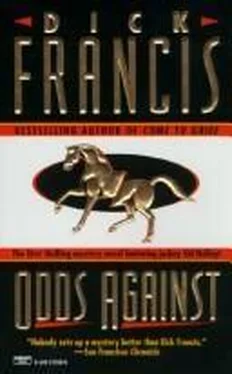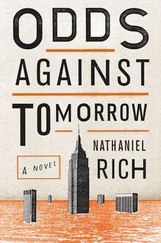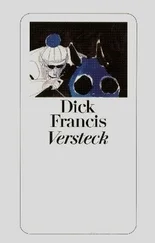Dick Francis - Odds against
Здесь есть возможность читать онлайн «Dick Francis - Odds against» весь текст электронной книги совершенно бесплатно (целиком полную версию без сокращений). В некоторых случаях можно слушать аудио, скачать через торрент в формате fb2 и присутствует краткое содержание. Год выпуска: 1987, ISBN: 1987, Издательство: Ballantine Books, Жанр: Детектив, на английском языке. Описание произведения, (предисловие) а так же отзывы посетителей доступны на портале библиотеки ЛибКат.
- Название:Odds against
- Автор:
- Издательство:Ballantine Books
- Жанр:
- Год:1987
- ISBN:9780449212691
- Рейтинг книги:4 / 5. Голосов: 1
-
Избранное:Добавить в избранное
- Отзывы:
-
Ваша оценка:
- 80
- 1
- 2
- 3
- 4
- 5
Odds against: краткое содержание, описание и аннотация
Предлагаем к чтению аннотацию, описание, краткое содержание или предисловие (зависит от того, что написал сам автор книги «Odds against»). Если вы не нашли необходимую информацию о книге — напишите в комментариях, мы постараемся отыскать её.
Odds against — читать онлайн бесплатно полную книгу (весь текст) целиком
Ниже представлен текст книги, разбитый по страницам. Система сохранения места последней прочитанной страницы, позволяет с удобством читать онлайн бесплатно книгу «Odds against», без необходимости каждый раз заново искать на чём Вы остановились. Поставьте закладку, и сможете в любой момент перейти на страницу, на которой закончили чтение.
Интервал:
Закладка:
‘Only idiots laugh at nothing,’ said a voice in my ear. ‘What the hell are you looking so pleased about all of a sudden? And where the blazes have you been this last month?’
‘Don’t tell me you’ve missed me?’ I grinned, not needing to look round. We went together through the door of the high-up jockeys’ box, two of a kind, and stood looking out over the splendid racecourse.
‘Best view in Europe.’ He sighed. Mark Witney, thirty-eight years old, racehorse trainer. He had a face battered like a boxer’s from too many racing falls and in the two years since he hung up his boots and stopped wasting he had put on all of three stone. A fat, ugly man. We had a host of memories in common, a host of hard ridden races. I liked him a lot.
‘How’s things?’ I said.
‘Oh, fair, fair. They’ll be a damn sight better if that animal of mine wins the fifth.’
‘He must have a good chance.’
‘He’s a damn certainty, boy. A certainty. If he doesn’t fall over his god-damned legs. Clumsiest sod this side of Hades.’ He lifted his race glasses and looked at the number board. ‘I see poor old Charlie can’t do the weight again on that thing of Bob’s… That boy of Plumtree’s is getting a lot of riding now. What do you think of him?’
‘He takes too many risks,’ I said. ‘He’ll break his neck.’
‘Look who’s talking… No, seriously, I’m considering taking him on. What do you think?’ He lowered his glasses. ‘I need someone available regularly from now on and all the ones I’d choose are already tied up.’
‘Well, you could do better, you could do worse, I suppose. He’s a bit flashy for me, but he can ride, obviously. Will he do as he’s told?’
He made a face. ‘You’ve hit the bull’s eye. That’s the snag. He always knows best.’
‘Pity.’
‘Can you think of anyone else?’
‘Um… what about that boy Cotton? He’s too young really. But he’s got the makings…’ We drifted on in amiable chat, discussing his problem, while the box filled up around us and the horses went down to the start.
It was a three mile chase, and one of my ex-mounts was favourite. I watched the man who had my old job ride a very pretty race, and with half my mind thought about housing estates.
Sandown itself had survived, some years ago, a bid to cover its green tempting acres with little boxes. Sandown had powerful friends. But Hurst Park, Manchester and Birmingham racecourses had all gone under the rolling tide of bricks and mortar, lost to the double-barrelled persuasive arguments that shareholders liked capital gains and people needed houses. To defend itself from such a fate Cheltenham Racecourse had transformed itself from a private, dividend-paying company into a non-profit-making Holdings Trust, and other racecourses had followed their lead.
But not Seabury. And Seabury was deep in a nasty situation. Not Dunstable, and Dunstable Racecourse was now a tidy dormitory for the Vauxhall workers of Luton.
Most British racecourses were, or had been, private companies, in which it was virtually impossible for an outsider to acquire shares against the will of the members. But four, Dunstable, Seabury, Sandown and Chepstow, were public companies, and their shares could be bought on the open market, through the Stock Exchange.
Sandown had been played for in a staightforward and perfectly honourable way, and plans to turn it into suburban housing had been turned down by the local and county councils. Sandown flourished, made a good profit, paid a ten per cent dividend, and was probably now impregnable. Chepstow was surrounded by so much other open land that it was in little danger from developers. But little Dunstable had been an oasis inside a growing industrial area.
Seabury was on the flat part of the south coast, flanked on every side by miles of warm little bungalows representing the dreams and savings of people in retirement. At twelve bungalows to the acre — elderly people liked tiny gardens — there must be room on the spacious racecourse for over three thousand more. Add six or seven hundred pounds to the building price of each bungalow for the plot it stood on, and you scooped something in the region of two million…
The favourite won and was duly cheered. I clattered down the iron staircase with Mark, and we went and had a drink together.
‘Are you sending anything to Seabury next week?’ I asked. Seabury was one of his nearest meetings.
‘Perhaps. I don’t know. It depends if they hold it at all, of course. But I’ve got mine entered at Lingfield as well, and I think I’ll send them there instead. It’s a much more prosperous looking place, and the owners like it better. Good lunch and all that. Seabury’s so dingy these days. I had a hard job getting old Carmichael to agree to me running his horse there at the last meeting — and look what happened. The meeting was off and we’d missed the other engagement at Worcester too. It wasn’t my fault, but I’d persuaded him that he stood more chance at Seabury, and he blamed me because in the end the horse stayed at home eating his head off for nothing. He says there’s a jinx on Seabury, and I’ve a couple more owners who don’t like me entering their horses there. I’ve told them that it’s a super track from the horses’ point of view, but it doesn’t make much difference, they don’t know it like we do.’
We finished our drinks and walked back towards the weighing room. His horse scrambled home in the fifth by a whisker and I saw him afterwards in the unsaddling enclosure beaming like a Hallowe’en turnip.
After the last race I went to the Stewards’ tea room. There were several Stewards with their wives and friends having tea, but no Lord Hagbourne. The Stewards pulled out a chair, gave me a welcome, and talked as ever, about the racing. Most of them had ridden as amateurs in their day, one against me in the not too distant past, and I knew them all well.
‘Sid, what do you think of the new type hurdles?’
‘Oh, much better. Far easier for a young horse to see.’
‘Do you know of a good young chaser I could buy?’
‘Didn’t you think Hayward rode a splendid race?’
‘I watched the third down at the Pond, and believe me that chestnut took off outside the wings…’
‘…do you think we ought to have had him in, George?’
‘…heard that Green bust his ribs again yesterday…’
‘Don’t like that breed, never did, not genuine…’
‘Miffy can’t seem to go wrong, he’d win with a carthorse…’
‘Can you come and give a talk to our local pony club, Sid? I’ll write you the details… what date would suit you?’
Gradually they finished their tea, said good-bye, and left for home. I waited. Eventually he came, hurrying, apologising, explaining what had kept him.
‘Now,’ he said, biting into a sandwich. ‘What’s it all about, eh?’
‘Seabury.’
‘Ah yes, Seabury. Very worrying. Very worrying indeed.’
‘A Mr Howard Kraye has acquired a large number of shares…’
‘Now hold on a minute, Sid. That’s only a guess, because of Dunstable. We’ve been trying to trace the buyer of Seabury shares through the Stock Exchange, and we can find no definite lead to Kraye.’
‘Hunt Radnor Associates do have that lead.’
He stared. ‘Proof?’
‘Yes.’
‘What sort?’
‘Photographs of share transfer certificates.’ And heaven help me, I thought, if I’ve messed them up.
‘Oh,’ he said sombrely. ‘While we weren’t sure, there was some hope we were wrong. Where did you get these photographs?’
‘I’m not at liberty to say, sir. But Hunt Radnor Associates would be prepared to make an attempt to forestall the takeover of Seabury.’
Читать дальшеИнтервал:
Закладка:
Похожие книги на «Odds against»
Представляем Вашему вниманию похожие книги на «Odds against» списком для выбора. Мы отобрали схожую по названию и смыслу литературу в надежде предоставить читателям больше вариантов отыскать новые, интересные, ещё непрочитанные произведения.
Обсуждение, отзывы о книге «Odds against» и просто собственные мнения читателей. Оставьте ваши комментарии, напишите, что Вы думаете о произведении, его смысле или главных героях. Укажите что конкретно понравилось, а что нет, и почему Вы так считаете.












